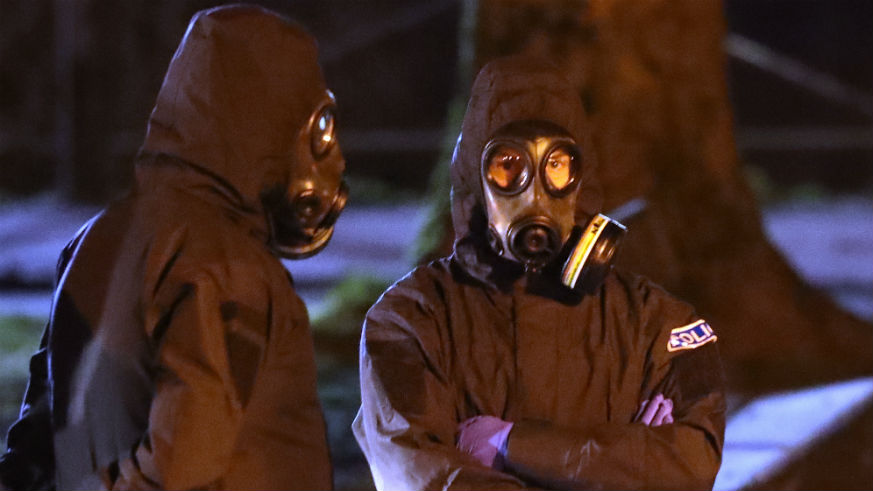The United Kingdom — along with the United States, Germany and France have denounced a recent attack on a former Russian double agent and his daughter as “an assault on U.K. sovereignty” and say the Vladamir Putin-led Russian government is to blame.
Sergei Skripal and his daughter, Yulia, were found unconscious from an apparently poisoning in Salisbury, England, on March 4. Yulia was found on a park bench “vomiting and fitting,” according to the BBC. She had also lost control of her bodily functions. Her father was “rigid and immobile” when they were discovered, CBS News added.
The cause of the attack? A nerve agent created in Russia.
“It is now clear that Mr. Skripal and his daughter were poisoned with a military-grade nerve agent of a type developed by Russia,” British Prime Minister Theresa May said after the attack. “This is part of a group of nerve agents known as Novichok.”
What is Novichok?
Novichok — named for the Russian word for “newcomer” — is a collection of what’s known as “binary weapons” that are harmless when stored separately, but become deadly after two certain ingredients are mixed. One of the agents known as A-230 is five to eight times more toxic than another nerve agent, VX, that can kill in minutes, according to the BBC.
“The U.S.S.R. is the only country to have developed and produced these [Novichok] agents,” Jean Pascal Zanders, a former senior research fellow at the European Union Institute for Security Studies, told Chemical & Engineering News. “It’s almost as though the Russians are sending a message to the West that they can reach anywhere, whenever they like.”

And that’s a big problem, given that so little is known about Novichok, including exactly how it works as a nerve agent to kill.
What are nerve agents?
To better understand why such an attack is so dangerous, we first have to understand how nerve agents work.
At the basic level, nerve agents are highly toxic chemicals designed to block an enzyme that connects the central nervous system to nerves and muscles.
“You’re tearing, you have a runny nose, you have fluid in your lungs, you have lots of diarrhea, you’re sweating, and these agents also slow your heart rate down,” Peter Chai, a medical toxicologist at Brigham and Women’s Hospital in Boston, told The Verge. “You basically asphyxiate in your own secretions. So, it’s a horrible way to die.”
Nerve agents were created by accident in the 1930s by scientists looking to create a better pesticide. Governments — both in the U.S. and abroad — started experimenting with the chemicals in the late 1940s.
How are nerve agents transmitted?
They can be created in different forms, like powder and gas, but liquids are the most popular choice because they can permeate skin and, ultimately, create chaos faster — within five to 15 minutes if given in correct doses.

There are three types of these nerve agents: Novichok, G-Agents and V-Agents.
G-Agents have sarin, while V-Agents include VX, an amber liquid that resembles oil. G-Agents have been used by the Syrian government on civilians, while VX Agents are responsible for the death of Kim Jong-un’s half brother, Kim Jong-nam, in Malaysia in 2017. The agent was smeared on his face and he died 20 minutes later.
Skripal and his daughter were attacked when the nerve agent was smeared on his car door handle.
Can you survive a nerve agent attack?
The chances of the general public being exposed to nerve agents is low, but it can happen. More than 500 people were believed to have been exposed to Novichok because Skripal and his daughter visited a local pub and restaurant on the same night they were attacked.
People who were potentially exposed were advised to wash their clothes, but the non-direct exposure poses little risk.
The road isn’t so smooth for Skripal and his daughter. The condition of the pair is being kept secret — and friends wonder if Yulia is even still alive. However, antidotes like atropine can reverse the effects of chemical agents, but time is of the essence.
“The problem occurs if the treatment is not provided quickly,” Alastair Hay, emeritus professor of environmental toxicology, told the BBC.
“There is paralysis of the nerves and the muscles, and that inhibits breathing and leads to some damage in the brain. At this stage we don’t know if that is a problem,” Hay continued. “Many people appear to recover without too many long-term problems but we won’t know until we know the severity of their symptoms.”
It’s extremely unlikely that average people can get ahold of the chemicals needed to make these weapons. Their existence is enough to worry experts, though: Russia claimed to have destroyed its 39,967 supply of chemical weapons in September 2017, according to the Organization for the Prohibition of Chemical Weapons.





















